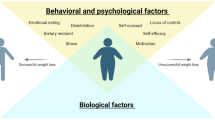Abstract
A disconnect between research findings and public beliefs may lead to further dieting failures for consumers. Participants (N=300) were surveyed to determine their weight loss practices, opinions of weight loss methods, and rated the acceptability of popular and empirically validated weight loss programs. Dieting, the intention to diet, and the use of popular diets and diet aids were prevalent. There was a tendency for participants to view weight as more of a problem for society than themselves. The Behavioral Program was rated as most acceptable and Surgical Treatment least acceptable. However, participants were more likely to try a popular diet or supplement. It is vital for researchers and clinicians to improve communication with the public about efficacious weight loss programs.
Similar content being viewed by others
References
World Health Organization. Obesity and overweight. What are overweight and obesity? http://www.who.int/mediacentre/factsheets/fs311/en/index.html 2006, September.
Kaplan RM. Should Medicare reimburse providers for weight loss interventions? Am Psychol 2007; 62: 217–9.
Latner JD, Wilson GT, Stunkard AJ, et al. Self-help and long-term behavior therapy for obesity. Behav Res Ther 2002; 40: 805–12.
Maggard MA, Shugarman LR, Suttrop M, et al. Metaanalysis: Surgical treatment of obesity. Ann Intern Med 2005; 142: 547–59.
Rucker D, Padwal R, Li SK, et al. Long term pharmacotherapy for obesity and overweight: Updated metaanalysis. BMJ 2007; 335: 1194–9.
Douketis JD, Macie C, Thabane L, et al. Systematic review of long-term weight loss studies in obese adults: Clinical significance and applicability to clinical practice. Int J Obes 2005; 29: 1153–67.
Mann T, Tomiyama AJ, Westling E, et al. Medicare’s search for effective obesity treatments: Diets are not the answer. Am Psychol 2007; 62: 220–33.
Powell LH, Calvin III JE, Calvin JE Jr. Effective obesity treatments. Am Psychol 2007; 62: 234–46.
Freedman MR, King J, Kennedy E. Popular diets: A scientific review. Obes Res 2001; 9: 1S–40S.
Celio CI, Luce KH, Bryson SW, et al. Use of diet pills and other dieting aids in a college population with high weight and shape concerns. Int J Eat Disord 2006; 39: 492–7.
Newberry H, Beerman K, Duncan S, et al. Use of nonvitamin, nonmineral dietary supplements among college students. J Am Coll Health 2001; 50: 123–9.
Bish CL, Blanck HM, Maynard LM, et al. Health-related quality of life and weight loss among overweight and obese U.S. adults, 2001 to 2002. Obesity 2006; 14: 2042–53.
Weiss EC, Galuska DA, Khan LK, et al. Weight control practices among U.S. adults 2001–2002. Am J Prev Med 2006; 31: 18–24.
Timko CA, Perone J, Crossfield A. Are you currently on a diet? What respondents mean when they say “yes”. Eat Disord 2006; 14: 157–66.
Dansinger ML, Augustin Gleason J, Griffith JL, et al. Comparison of the Atkins, Ornish, Weight Watchers, and Zone diets for weight loss and heart disease risk reduction: A randomized trial. JAMA 2005; 293: 43–53.
Anderson JW, Konz EC, Jenkins DJA. Health advantages and disadvantages of weight reducing diets: A computer analysis and critical review. J Am Coll Nutr 2000; 19: 578–90.
Jorm AF, Barney LJ, Christensen H, et al. Research on mental health literacy: What we know and what we still need to know. Aust NZ J Psychiatry 2006; 40: 3–5.
Kazdin AE. Acceptability of child treatment techniques: The influence of treatment efficacy and adverse side effects. Behav Ther 1981; 12: 493–506.
Eckert TL, Hintze JM. Behavioral conceptions and applications of acceptability: Issues related to service delivery and research methodology. Sch Psychol Q 2000; 15: 123–48.
Miltenberger RG. Assessment of treatment acceptability: A review of the literature. Topics Early Child Spec Educ 1990; 10: 24–38.
Krain AL, Kendall PC, Power TJ. The role of treatment acceptability in the initiation of treatment for ADHD. J Att Dis 2005; 9: 425–34.
Reimers TM, Wacker DP, Cooper LJ, et al. Clinical evaluation of the variables associated with treatment acceptability and their relation to compliance. Behav Disord 1992; 18: 67–76.
Reimers TM, Wacker DP, Cooper LJ, et al. Acceptability of behavioral treatments for children: Analog and naturalistic evaluations by parents. Sch Psychol Rev 1992; 21: 628–43.
Allinder RM, Oats RG. Effects of acceptability on teachers’ implementation of curriculum-based measurement and student achievement in mathematics computation. Rem Spec Educ 1997; 18: 113–20.
Kiefer I, Rathmanner T, Kunze M. Eating and dieting differences in men and women. J Mens Health Gender 2005; 2: 194–201.
Kelley ML, Heffer RW, Gresham FM, et al. Development of a modified treatment evaluation inventory. J Psychopathol Behav Assess 1989; 11: 235–47.
Varnado-Sullivan PJ, Horton RA. Acceptability of programs for the prevention of eating disorders. J Clin Psychol 2006; 62: 687–703.
Cooper PJ, Taylor MJ, Cooper Z, et al. The development and validation of the Body Shape Questionnaire. Int J Eat Disord 1987; 6: 485–94.
Heinberg LJ, Thompson JK, Stormer S. Development and validation of the Sociocultural Attitudes Toward Appearance Questionnaire. Int J Eat Disord 1995; 17: 81–9.
Varnado-Sullivan PJ, Horton R, Savoy S. A comparison of male and female body image: The role of gender, exercise and weight status. Eat Weight Disord 2006; 11: 118–25.
Shapiro JR, Anderson DA. The effects of restraint, gender, and body mass index on the accuracy of selfreported weight. Int J Eat Disord 2003; 34: 177–80.
Author information
Authors and Affiliations
Corresponding author
Additional information
Portions of the preliminary data from this article were presented at the annual meeting of the Southwestern Psychological Association (SWPA), March, 2005.
Rights and permissions
About this article
Cite this article
Varnado-Sullivan, P.J., Savoy, S., O’Grady, M. et al. Opinions and acceptability of common weight-loss practices. Eat Weight Disord 15, e256–e264 (2010). https://doi.org/10.1007/BF03325307
Received:
Accepted:
Published:
Issue Date:
DOI: https://doi.org/10.1007/BF03325307



